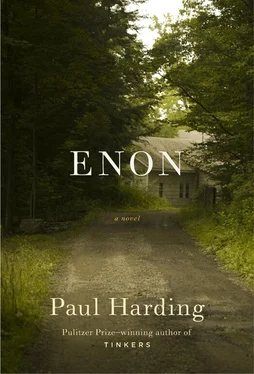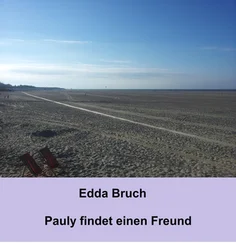Paul Harding - Enon
Здесь есть возможность читать онлайн «Paul Harding - Enon» весь текст электронной книги совершенно бесплатно (целиком полную версию без сокращений). В некоторых случаях можно слушать аудио, скачать через торрент в формате fb2 и присутствует краткое содержание. Жанр: Современная проза, на английском языке. Описание произведения, (предисловие) а так же отзывы посетителей доступны на портале библиотеки ЛибКат.
- Название:Enon
- Автор:
- Жанр:
- Год:неизвестен
- ISBN:нет данных
- Рейтинг книги:3 / 5. Голосов: 1
-
Избранное:Добавить в избранное
- Отзывы:
-
Ваша оценка:
- 60
- 1
- 2
- 3
- 4
- 5
Enon: краткое содержание, описание и аннотация
Предлагаем к чтению аннотацию, описание, краткое содержание или предисловие (зависит от того, что написал сам автор книги «Enon»). Если вы не нашли необходимую информацию о книге — напишите в комментариях, мы постараемся отыскать её.
Powerful, brilliantly written, and deeply moving Paul Harding has, in Enon, written a worthy successor to Tinkers, a debut which John Freeman on NPR called "a masterpiece." Drawn always to the rich landscape of his character's inner lives, here, through the first person narrative of Charlie Crosby (grandson to George Crosby of Tinkers), Harding creates a devastating portrait of a father trying desperately to come to terms with family loss.
Enon — читать онлайн бесплатно полную книгу (весь текст) целиком
Ниже представлен текст книги, разбитый по страницам. Система сохранения места последней прочитанной страницы, позволяет с удобством читать онлайн бесплатно книгу «Enon», без необходимости каждый раз заново искать на чём Вы остановились. Поставьте закладку, и сможете в любой момент перейти на страницу, на которой закончили чтение.
Интервал:
Закладка:
I had cast Enon’s dead in the vignettes I made up for Kate, but as I became more and more unbalanced, they seemed to act of their own accord. Certainly, it was the drugs and my exhaustion and my sorrow producing these phantasms, but they haunted me nonetheless, and with increasing frequency and vividness. I understood how dire such hallucinations were becoming late one early summer night when I sat down to rest at the edge of one of the putting greens on the Enon Golf Club, near the street. I sat on the grass, put my legs out in front of me, leaned back against the stone wall, closed my eyes, and took a deep breath. I opened my eyes and felt suddenly as if I were awaiting the beginning of a performance of some kind. The grass was wet and smelled vegetal for the first time in weeks, not like hay, not like thatch. Wind swelled and ebbed like a surf, and broke against the foliage in the rows of trees running up the hill between the golf course and the cemetery, sizzling through it and rushing across the open fairway in front of me. The green slope of the hill was only just still green, lowering into black. A low, dark, nearly green band of thunderheads, in front of a scrim of solid, lighter gray clouding that held the very last of the day’s light, a suffused luminescence that seemed without source, not even light, not even a sight, receded behind the hill, so swiftly it made the hill appear to loom up above me, ready to topple onto my head. I rubbed the tops of my arms, chilled. The streetlamp in the parking lot of the golf course clubhouse flickered on, halfway up the hill, to my left, behind a break of beech trees, figuring their branches and leaves into a hive of citrine light. Ocean fog poured across fairways from the cemetery, salting everything in a cold mist. Caverns under the hill and granite shelves and the water in the water table vibrated beneath me, voicing an unnerving basso profundo. The wind funneling through the stone walls sounded a strange descant in the hollows. My bones and bowels and breathing slowed and fell into cycle with this dark solfège and I whispered the note “La.”
The heel bones of a pilgrim or cobbler ran across my flanks from beneath, and an arpeggio of ribs, and the smooth curve of someone’s skull.
Places, everyone. Please take your seats. If you please .
The key of the overture is disturbing. I shift on my haunches and shiver at a coldness that has descended across the landscape, and feel a little nauseated. I have a sense that there is something telescopic about this production, as if I am actually on a stage, in the foreground, and not in the audience. The music I hear is not for me but for an audience on the far side of a proscenium, watching me watch for the entrance of other actors deeper in the stage. I put my head between my knees and breathe deeply. My stomach is sour and my vision fizzy.
There is a cavernous open space behind me, stalls and vertically stacked galleries and state boxes filled with rowdy old phantoms and spooky pilgrims, elbowing one another and leaning over and whispering, Look, he doesn’t feel so good now!
Mockery and laughter ripple through the audience, across the orchestra, all the way from the grand circle to the loge to the gods near the cloud ceiling. I look behind me and see only the empty street. This elicits a frank, unabashed guffaw from the hidden spectators, who find my inability to see them hysterical. This is at my expense; their laughter is delight not at how well I play the fool, but at the fact that I am one.
Then the hill does loom up, blotting out everything behind it. It teeters, splits down the middle, like a curtain, and crumples into two heaps on either side of a dim gray pillar glazed in the faintest yellow light and set in relief against a background of sable darkness. Bones rise from the dark earth. There are clavicles and ribs, femurs and tibias, hands and feet. There are claws and great spines as thick as tree trunks that taper into tails, and rings of vertebrae that once encased marrow the size of pot roasts, and heavy garlands made from the gut-strung skulls of tens of thousands of rodents, draped over horses’ skulls that have been fused onto the delicate skeletons of human infants. The riot of interlocking bones turns and forms a towering girandole. I try to concentrate on the writhing, clicking, tapping, grinding, clunking monument, to get a clear view of individual bones, especially skulls, because when I look at it as a whole, it increasingly seems composed of animals that could not possibly have ever existed, and that it is assembling into some horrific machine dedicated to manufacturing my deepest terrors. But then the middle of the machine spirals open like the aperture of a camera shutter, and Kate steps out.
She is fitted into an outrageous, gigantic emerald green polonaise. The dress is verdant and oceanic, mossy and Atlantic green. The bodice is constructed of willow branches, stripped to the green wood, girthed tight with eelgrass. Will-o’-the-wisps halo Kate’s head. Her hair is suffused and golden, flaring, solar.
Well, well, now .
My , my, isn’t that interesting?
What fantastications are these?
I ignore the insults and the jeers from the balconies that continue to rise higher behind me, across the road, in the darkness of the cornfield. Kate is magnificent and beautiful, if not a queen then a princess, repatriated into the wood and the water and the starry sky and the cold ocean abysses broiling beyond the continental shelf, just beyond the rise, through the trees, not presiding but naturalized. Yes, I think, this must be her first pageant, an equinoctial communion, restoration after a satisfactory yearlong trial as a member of the deceased.
A menagerie of horse and pony skeletons prance around the stage in exaggerated, ambling gaits, draped in caparisons made from their own former hides.
A pillar of fire erupts from the top of the hill and towers miles up into the night until it breaks against the invisible ceiling of the atmosphere and fans out across the sky in flaming traceries. A great crown of fire burns miles above Enon, bejeweled with Ursa’s stars.
Kate watches the fire from her mark onstage, in front of the whirling shutter of bones, which seem to rotate within their revolutions, alternating between the reliquaries of legends and dinner-plate leftovers, one instant the remains of leviathans and saints, the next drumsticks and short ribs. Kate cranes her neck to follow the fire up into the heights and I see that the rest of her does not move, that beneath her gown she has been clamped into some sort of frame. Her arms are raised to shoulder height and bent at the elbows so that the tips of her fingers nearly meet in front of her chest. She cannot move her arms. They are confined by some kind of armature beneath the gown and only her hands are free at the wrists. This confirms why there is stiffness in how she moves her head to look up at the fire. She cannot rotate her shoulders or her torso or her hips, or turn on her feet to get a better look at the braided column of flames roaring behind her. I can feel its heat from where I sit. She is much nearer to it, and although I have the thought that she is no longer subject to burning, I also have the sense that she is burning, and that she cannot move herself back from the heat. I can see now — not actually see with my eyes, but see in my head, know — that Kate has been fixed to some kind of rigid frame made of wooden strapping and hammered iron rivets, not so much to restrict her, perhaps, but to insulate her from the weight of the costume, a lesser kindness within a greater cruelty, sponsored by an ultimate benevolence, possibly if not probably, which I now see is laden with clots of gems and strings of pearls and made from bolt after bolt of silk brocade and lace, douppioni and zibeline, and trussed and knotted with leagues of silk ribbon, and mounted on a series of concealed panniers that spring out and upward, elevating Kate to a preposterous height just as it occurs to me that they are present beneath the fabric. Kate rises and the skirts of her dress cascade from beneath her and across the green. I can hear pulleys and winches turning and squeaking. Kate’s ascent illuminates a system of fine silk threads, tied to the tips and the joints of each of her fingers, which rise above her and disappear in the upper darkness and lift and lower her fingers according to elegant but predetermined pattern. I squint to get a look at the darkness above Kate’s head, certain there must be a scrim of black velvet, perfectly lit to blend in with the real night, that conceals a rotating brass drum bristling with stubs that pluck the tines of a metal comb. Each of the threads connected to Kate’s wrists and fingers is looped around one of the tines. As the drum revolves, her hands perform an intricate set of poses. I am terrified that Kate is going to be immolated. I panic and try to rise but I cannot move. The crowd roars with laughter.
Читать дальшеИнтервал:
Закладка:
Похожие книги на «Enon»
Представляем Вашему вниманию похожие книги на «Enon» списком для выбора. Мы отобрали схожую по названию и смыслу литературу в надежде предоставить читателям больше вариантов отыскать новые, интересные, ещё непрочитанные произведения.
Обсуждение, отзывы о книге «Enon» и просто собственные мнения читателей. Оставьте ваши комментарии, напишите, что Вы думаете о произведении, его смысле или главных героях. Укажите что конкретно понравилось, а что нет, и почему Вы так считаете.












